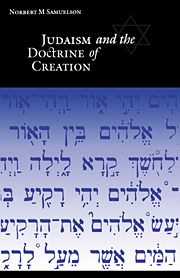PART 2 - A JEWISH VIEW OF CREATION
Published online by Cambridge University Press: 08 January 2010
Summary
The charge that Rosenzweig's philosophical theology is not Jewish is both general and specific. In general the objection is that philosophy is foreign to Judaism. It is true that at one time in Jewish history – from the time of Saadia in the tenth century through the time of Albo in the fifteenth, rabbinic Jews engaged in philosophical speculation about the doctrines of Jewish faith. However, that period constitutes an exception to the major trends in Jewish civilization, where the emphasis is always on praxis and (possibly) spirituality, but not on conception. Philosophic speculation is a foreign import that infected Judaism for one period (viz., when Islamic civilization dominated the ways that Jews think), but it was precisely that – an infection. Fortunately Judaism cured itself and subsequently returned to its more characteristic pragmatic concerns with law and ethics. The only other period of infection was the late nineteenth-, early twentieth-century Germanic tradition of Hermann Cohen and those whom he influenced (Baeck, Buber, Rosenzweig, etc.), but this period also is an aberration. It occurred because of the highly assimilated condition of German Jewry under the dominant influence of liberal Protestantism.
Underlying this general objection are a number of assumptions about Judaism, two of which are relevant to our enterprise. The first is that only what is distinctively the product of Jewish civilization should be called “Jewish.” The second is that certain periods are more definitive of Judaism than others. The claim is that because the Hebrew scriptures, the early works in Jewish law (viz., the Mishnah and the two talmuds) and (possibly) the early commentaries on the Bible (viz., classical midrash) are uniquely Jewish products, they define what Judaism is.
- Type
- Chapter
- Information
- Judaism and the Doctrine of Creation , pp. 75 - 80Publisher: Cambridge University PressPrint publication year: 1994



